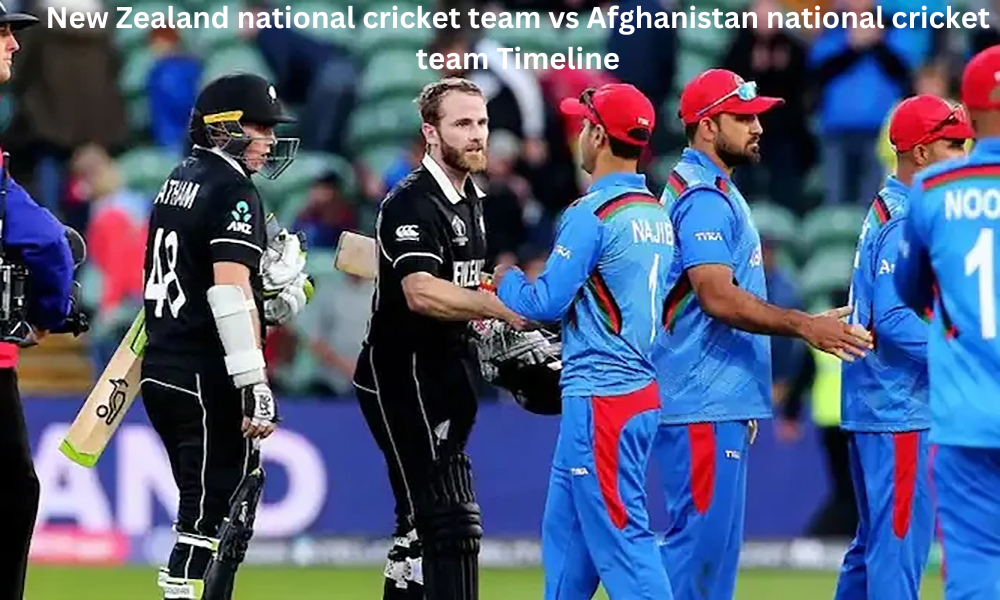Cricket, a game steeped in history and tradition, sees many evolving rivalries, but few are as compelling in contrast as the contests between the New Zealand national cricket team vs Afghanistan national cricket team timeline. This article explores the historic timeline of their encounters, evaluates the strengths of both teams, and delves into memorable matches, key players, and what the future holds for this unique rivalry.
Introduction to the Historic Timeline
The cricketing journey between New Zealand and Afghanistan, although relatively recent, has quickly become a topic of interest among cricket enthusiasts worldwide. While New Zealand has a long and storied cricket history, Afghanistan’s rise in international cricket is a modern tale of rapid ascent and growing prowess. This juxtaposition adds a layer of intrigue to their matchups.
Early History and Today’s Context
The New Zealand national cricket team, known as the Black Caps, played its first international match in 1930 against England. In contrast, Afghanistan, which only gained ODI status in 2009, played its first official ODI against Scotland in April 2009. The stark difference in their cricketing timelines sets a fascinating backdrop for their interactions.
The first official encounter between New Zealand and Afghanistan took place during the 2015 ICC World Cup. This match marked a significant moment, symbolizing Afghanistan’s entry into cricket’s bigger arenas and challenging established teams like New Zealand.
Key Players and Rivalry
Over the years, players from both sides have turned matches into personal battlefields of skill and strategy. For New Zealand, players like Kane Williamson and Trent Boult have been instrumental in crucial games, using their experience to navigate the team through high stakes. Afghanistan has answered with stars like Rashid Khan and Mohammad Nabi, whose talents have not only defined matches but have also elevated the team’s global reputation.
Memorable Matches Between the Teams
One of the most unforgettable matches between the two teams was during the 2019 ICC World Cup. New Zealand’s disciplined approach met Afghanistan’s spirited play, creating a tense and memorable game. Such matches have not only entertained but also helped build a respectful rivalry that promises exciting encounters in the future.
Recent Performances in International Tournaments
In recent years, both teams have shown significant prowess in international tournaments. New Zealand’s consistency and Afghanistan’s unpredictable, aggressive cricket make every encounter unpredictable and thrilling. Their performances in the T20 World Cups and Asia Cups have been particularly noteworthy, showcasing growth and adaptation.
The Impact of Socio-Political Contexts on Cricket Development
Afghanistan’s cricket story is as much about its socio-political challenges as it is about sports. The country’s journey in cricket began amidst ongoing conflicts and has served as a beacon of hope and unity for its people. This contrasts significantly with New Zealand’s more stable cricket development, supported by robust sporting infrastructure and a long-standing culture of cricket. The way each team approaches the game is reflective of their backgrounds—New Zealand with its methodical and professional approach, and Afghanistan with its passionate and fearless play. This difference enriches their encounters, offering fans a blend of styles that speaks volumes about the resilience and adaptability of cricket as a sport.
Strategic Styles and Adaptation in Matches
New Zealand’s cricket strategy is often characterized by its adaptability and tactical intelligence, honed through decades of international experience. This is evident in their careful game planning and execution, particularly in bowling and field management. On the other hand, Afghanistan has brought an aggressive and bold style to the field, primarily driven by their spin-heavy attack. The contrast in playing styles has led to intriguing clashes between the two, with each match serving as a lesson in cricketing philosophy and adaptation. The strategic nuances displayed by both teams provide deep insights into the evolving nature of modern cricket.
Cultural Exchange and Mutual Learning
Every match between New Zealand and Afghanistan transcends the boundaries of a simple game; it becomes a moment of cultural exchange and mutual learning. The interactions between the players, both on and off the field, help in fostering respect and understanding across diverse cultural backgrounds. These matches are a testament to cricket’s power to bridge differences and promote global unity. For instance, Afghanistan’s spinners often exchange tips with their New Zealand counterparts, illustrating the shared learning that occurs when these two teams meet.
Youth Development and Future Talent
Both New Zealand and Afghanistan place a strong emphasis on nurturing young talent, which is crucial for their future prospects. New Zealand’s domestic cricket structure is well-established, allowing young players to develop through a clear pathway. Afghanistan, despite its newer status in international cricket, has made significant strides in youth cricket development, often under challenging conditions. The emergence of young players from both countries, ready to make their mark on international cricket, ensures that the rivalry will only get more intense. This infusion of fresh talent is vital for keeping the cricketing rivalry dynamic and competitive.
The Role of International Cricket Council (ICC)
The International Cricket Council (ICC) plays a significant role in shaping the cricketing relations between New Zealand and Afghanistan, particularly in terms of scheduling, funding, and developmental support. Afghanistan’s rise in international cricket has been significantly supported by the ICC, which has provided platforms like the World Cup and the T20 leagues for them to showcase their talent. For New Zealand, the ICC’s initiatives in promoting cricket globally have allowed them to extend their influence and competitive spirit worldwide. The council’s policies and support systems are crucial in maintaining the competitive balance and fairness in games between such diverse cricketing nations.
The Future of the Rivalry
Looking ahead, the rivalry between New Zealand and Afghanistan is poised to grow in intensity and competitiveness. With Afghanistan’s cricket infrastructure developing and New Zealand continuing to produce world-class talent, the future encounters between these teams are eagerly anticipated by fans around the world.
Conclusion
The cricketing New Zealand national cricket team vs Afghanistan national cricket team timeline may not be the longest, but it is rich with potential and promise. As Afghanistan continues to build its cricketing legacy and New Zealand maintains its high standards, the rivalry is set to become even more prominent in the cricketing world. The blend of experience and emerging talent promises exciting times ahead for fans of both teams.
Frequently Asked Questions
Q1: When did Afghanistan play their first match against New Zealand?
A1: Afghanistan faced New Zealand for the first time in a One Day International during the 2015 ICC Cricket World Cup.
Q2: Which team has a better record in ICC tournaments?
A2: New Zealand has a more established record in ICC tournaments, given their longer history in cricket and consistent performance.
Q3: Who are some of the key players in this cricket rivalry?
A3: For New Zealand, key players include Kane Williamson and Trent Boult, while Afghanistan has been strongly represented by Rashid Khan and Mohammad Nabi.
Q4: What makes matches between New Zealand and Afghanistan unique?
A4: The unique aspect of these matches lies in the contrasting backgrounds and playing styles of the teams, reflecting their different cricketing philosophies and cultural influences.
Q5: How has Afghanistan’s cricket team impacted their nation?
A5: Afghanistan’s cricket success has brought significant national pride and unity to a country marred by decades of conflict, showcasing the unifying power of sports.


